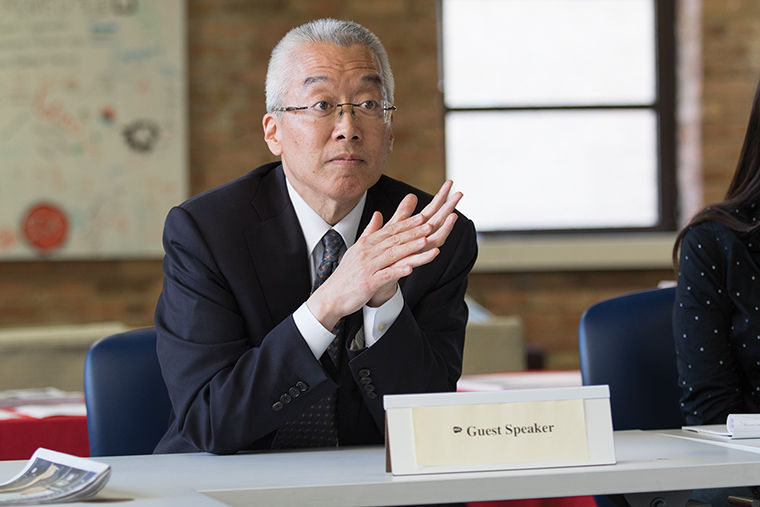More than 1,000 students waiting for MAP grant funding
President and CEO Kwang-Wu Kim said he encourages students to bring forward their voices in the MAP grant issue to capture the legislature’s attention.
October 5, 2015
The state of Illinois has been operating without a budget since July 1, causing uncertainty as to how the state-funded Monetary Award Program grants will be funded for students in colleges across the state, including Columbia.
Cynthia Grunden, assistant vice president of Student Financial Services, said 1,814 Columbia students were expecting money for the MAP grant with more than $3.8 million earmarked for the students for the Fall 2015 Semester, as of Sept. 15.
“We don’t know how long it will take for [the government] to reach the budget,” Grunden said. “As soon as we have news, whether it is good or bad, it will be communicated to students.”
According to Grunden, students not currently receiving MAP grants will have that money deferred, meaning financial holds will not be placed for students reliant on those funds as long as the amount not paid does not exceed their grant money.
Grunden said at this point, there is no indication the MAP grant program will be eliminated or reduced, but to help with the current delay, she encourages students to get involved and share their own stories with state representatives about how the grant helps them pay for and finish college.
“It’s one thing for people working at a college to say their students are suffering,” Grunden said. “It’s another thing for students to really tell their story and not be a number, but a person. I definitely want students to advocate for themselves.”
As reported May 11 by The Chronicle, 1,923 students received MAP grant funding for the 2014–2015 academic year, with a sum of $7.3 million dollars received by students. Grunden said the decline is because the MAP program’s deadline is earlier each year, and some students miss it as a result.
President and CEO Kwang-Wu Kim spoke about the grants being delayed at the Sept. 22 Student Government Association meeting. He said SGA senators—particularly the executive board—need to bring forward a voice in the issue.
“I think it could be a great focus for SGA—especially student government—to think about how you focus the voice of concern for students here but also for students in all the downtown campuses,” Kim said.
Arissa Scott, a senior fashion studies major and SGA’s student representative to the board of trustees, said DePaul University’s SGA President Vanessa Cadvillo reached out to Jerel Ballard, Columbia’s SGA president, to consider how the two governance bodies could team up to brainstorm solutions.
Scott said one possible solution is making an emergency trip to Springfield to lobby at the State Treasury, and another is seeing whether a State Treasury representative could speak to DePaul and Columbia students. She said whichever route SGA can accomplish faster is the one they will take.
“There are students at this school whose accounts are on hold, who are suffering from this delay, from the budget not being complete,” Scott said. “Students are being directly affected by that and people are not happy. We are trying to figure out a way to effectively communicate that to the state as urgently as possible.”
Scott said she thinks SGA would serve as a major voice to students facing the MAP grant delay, especially because they have lobbied on issues regarding MAP funding in the past.
“If we can get another school to go down there and lobby again at the state treasurer’s, then [the government] can understand the urgency and the importance of this grant,” Scott said.
Cristina Granados, a sophomore theatre major, said she did not know about the issue with the state budget until she received an email from Student Financial Services alerting her of a delay on her MAP grant.
“[The email] said they weren’t sure when the grants were going to come through,” Granados said. “It explained it wouldn’t affect you in terms of having a hold on your account if you had a balance that wasn’t greater than the grant amount.”
Grunden said from a practical perspective, she thinks students who were depending on a MAP grant giving them a financial aid refund probably need to make alternative plans to cover indirect educational expenses as best as possible.
Granados said she visited the SFS office and was told because the issue is not under the students’ control, they have to wait and see what happens, but it should not negatively affect students.
“I think everyone’s just hoping it is taken care of before the semester’s over, but then there’s the question of, ‘What if it’s not?’” Granados said. “Then what happens? Then where are you left with the big gap you have in your account?”








